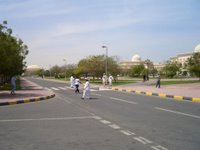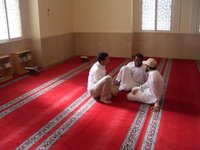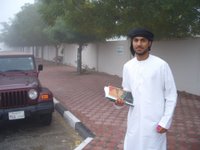What's Your Good Name?
It's a sea of white dishdashas
Warming up to the campus community was effortlessly easy; as simple as greeting and being greeted with Salaam by virtually everybody you bumped into
 as you made your way around—be they in the ever popular dishdasha or in t-shirt and jeans, accordingly equipped with either tasbeeh beads, or a handsfree mobile device, or an MP3 player in hand. Even though it was just as commonplace back in IIUM, the indiscriminate exchange of greetings evoked a different feeling this time around, one of welcome, peace and unconditional solidarity.
as you made your way around—be they in the ever popular dishdasha or in t-shirt and jeans, accordingly equipped with either tasbeeh beads, or a handsfree mobile device, or an MP3 player in hand. Even though it was just as commonplace back in IIUM, the indiscriminate exchange of greetings evoked a different feeling this time around, one of welcome, peace and unconditional solidarity.But of course, the sudden appearance of four Malaysian students in their midst intrigued the campus denizens at the same time, and in various ways.
For Abu Bakr, Bashir and Khaled, fellow residents at the Saad Ibn Abi Waqqas block, it was a pleasant reminder of good times with their two Malaysian mates who were the IIU representatives last year. Over the weeks and the regular visits to their rooms for group dinners and snacks, we had grown to be good friends from just neighbors with the Yemeni, the Eritrean, and the Algerian. It was at these sessions that we shared stories, jokes and curious questions about one another—from the amazing Malaysian weather with its abundant rainfall to the marriage customs of Yemen.
Our little group eventually grew as we connected with more of their mates—like Palestinian Mahmood with his American accent and Abdul Aziz, a Saudi moallad
 with Pakistani blood—alongside others we came across in various circumstances. One thing that struck me amused in particular was the polite, flattering query for your name— “Esmok al kareem? What’s your good name?” That and also the multiple versions of “How do you do?” received at every greeting, which of course almost always prompted me to reply back in no less than a dozen versions of “I’m fine/good/superb/perfect thanks!” It was also common then to receive curious guesses of our origins, with China and/or the Philippines leading most of the attempts. Those who guessed correct on the other hand, would display great interest in the Malaysian politics, economy, infrastructure, and last but not least, the enviable forests, mountains and beaches enjoyed on our side of the globe.
with Pakistani blood—alongside others we came across in various circumstances. One thing that struck me amused in particular was the polite, flattering query for your name— “Esmok al kareem? What’s your good name?” That and also the multiple versions of “How do you do?” received at every greeting, which of course almost always prompted me to reply back in no less than a dozen versions of “I’m fine/good/superb/perfect thanks!” It was also common then to receive curious guesses of our origins, with China and/or the Philippines leading most of the attempts. Those who guessed correct on the other hand, would display great interest in the Malaysian politics, economy, infrastructure, and last but not least, the enviable forests, mountains and beaches enjoyed on our side of the globe.The Emirati offer
I was presented with pleasant news one evening after maghrib prayers at the campus mosque. Two students—Muhammad and Omar, respectively Somali and Emirati—greeted me as I made my way back to the block, and they were, much to my surprise, Nursing majors with a situation similar to mine. Where I was apprehensive about crossing borders, they were already accustomed to the whole affair, as are the handful of other male Health Sciences students of various majors whom I never knew existed until that evening.
 The next surprise came shortly later when Omar invited me over to his room at the Salahuddin block where we stayed for the first night in Sharjah. Without warning, he suggested I move into his place which was pretty much impressive with its private kitchen, bathroom and a nice view—the offer was undeniably exciting. Not only would I be sharing a room with a fellow Health Science student, it also translated as an opportunity to live with a local for four months and enjoy a more wholesome and authentic experience. On a more personal level, the prospect of perfecting my Arabic in such an environment was truly a blessing—and the Emirati value of hospitality, legendary.
The next surprise came shortly later when Omar invited me over to his room at the Salahuddin block where we stayed for the first night in Sharjah. Without warning, he suggested I move into his place which was pretty much impressive with its private kitchen, bathroom and a nice view—the offer was undeniably exciting. Not only would I be sharing a room with a fellow Health Science student, it also translated as an opportunity to live with a local for four months and enjoy a more wholesome and authentic experience. On a more personal level, the prospect of perfecting my Arabic in such an environment was truly a blessing—and the Emirati value of hospitality, legendary.

